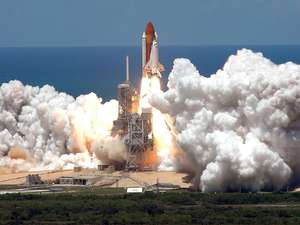Based on our current understanding of physics and the limits of the natural world, the answer, sadly, is no. According to Albert Einstein’s theory of special relativity, summarized by the famous equation E=mc2, the speed of light (c) is something like a cosmic speed limit that cannot be surpassed. So, light-speed travel and faster-than-light travel are physical impossibilities, especially for anything with mass, such as spacecraft and humans.
Even for very tiny things, like subatomic particles, the amount of energy (E) needed to near the speed of light poses a significant challenge to the feasibility of almost light-speed space travel. The Large Hadron Collider (LHC), the largest and highest-energy particle accelerator on Earth, has boosted protons (particles within atoms) as close to the speed of light as we can get. However, even a miniscule proton would require near-infinite energy to actually reach the speed of light, and humans haven’t figured out near-infinite energy quite yet.
Read the original article on britannica.com.
More about: spacetravel
















































